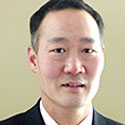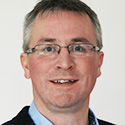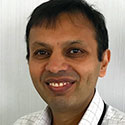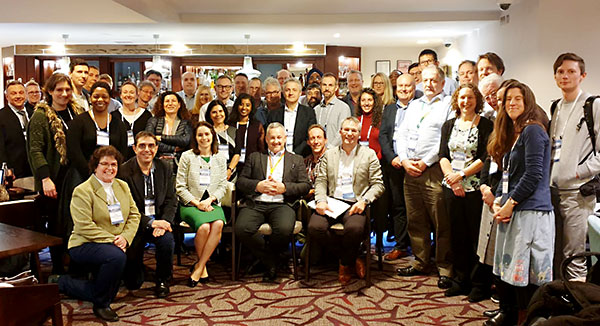CPSA USA · CPSA Shanghai · CPSA Brasil · CPSA Metabolomics · CPSA Analytics · CPSA Europe
®2021 Milestone Development Services. All rights reserved.
Clinical & Pharmaceutical Solutions through Analysis
February 5-8, 2019
London, U.K.
Where Technology and Solutions Meet
|
CPSA Europe 2019Meeting ProgrammeUpdated 4 March 2019 Tuesday | Wednesday | Thursday | Friday Tuesday February 5 1:00 PM - 4:30 PM Magdalene Room WORKSHOP Sponsored by Merck (MilliporeSigma in USA/Canada) If Our Own Scientific Community Does Not Have the Answer Where Do We Look? Workshop Leader: Jason Wrigley, Merck (MilliporeSigma in USA/Canada) This workshop starts with the premise that as specialists in a particular field we are not always necessarily the best people to develop and implement novel technological approaches. As such, it will provide an overview of where we currently are with this and what we do. This will be followed by an open floor discussion to see where we could go and look for ideas and solutions. This session does not have the answers but is looking to the audience to think differently and brainstorm where we might go and look for some answers/solutions. A fun and serious discussions will be concluded with action points for follow up to see if we really can find some novel (to our industry!) solutions. If you have a topic/area of interest you would like to include please inform us before the meeting – Think big!! 1:00 PM - 4:30 PM The Queen's Room WORKSHOP Sponsored by New Objective The Future of Personalized Healthcare: Workshop Leader: Emily Ehrenfeld, New Objective This solutions-based workshop will explore how we generate and utilize quantitative data for human healthcare and wellbeing. Established workflows for the generation of quantitative analytical data used for decision making by clinicians, pharmaceutical companies, central clinical laboratories and academics have remained essentially unchanged for decades. This approach has suited the established means of one size fits all approach to delivering healthcare. However, this approach is no longer ideal, or indeed sustainable. Personalized medicines and treatments are increasingly becoming the norm. Further, technologies are enabling patient sampling and subsequent analysis to be performed in locations and with technologies that are more patient centric and importantly, many subjects are taking a more active interest in their own medical data and the decisions resulting from it. This paradigm shift calls for a change from the established workflows. This workshop will explore these changes, their implications and what a new normal might look like in 5-10 years time. We welcome you to join our discussion. Panel Discussion: 6:00 PM - 9:00 pm The College Suite Welcome Reception Say hello to old friends and introduce yourself to new! Sponsored by New Objective Refreshments and light buffet served. Wednesday February 6 7:00 AM - 8:30 AM
Registration & Breakfast Breakfast in the Bridge Restaurant 8:30 AM - 8:45 AM The University Suite Welcome & Opening Remarks 
Welcome 
Format, Objectives, Opening Remarks 
8:45 am - 9:45 am The University Suite Plenary Lecture 
What Solutions are Needed to Meet the Health Needs of Future Generations? Hitesh Pandya, GlaxoSmithKline The terms health and healthcare encompass people, populations, systems, processes and structures. Innovation, change and investment have been the hallmarks of health and healthcare delivery over the past 200 years. Compared to 1800’s, people now live much longer. They are also less likely to die in early life as a result of complications at birth or lethal disorders such as cystic fibrosis and can live with a relatively good quality of life with chronic conditions such as diabetes and asthma. While spending on health and healthcare will continue at current levels for the foreseeable future, it seems unlikely that present levels of spending can afford the innovations and change required to meet the health needs of people with multiple chronic diseases living longer. One emerging unmet need in healthcare is complexity. Complexity in health refers to managing people with multiple disorders and analysing the vast and disparate amounts of data about them (demography, lifestyle, genetics, laboratory tests etc) and their ailment(s) to determine optimal treatments. Can we reduce the number of women needing costly IVF therapy to have babies? Am I over-eating and what foods will stop me getting fat? How can I sleep better for better mental health? How well we deal with the challenges of healthcare has always impacted on society. This presentation outlines a future where people are empowered to manage their health firstly to keep them from becoming ill and if unwell, how best to manage their ailments in the community. What solutions do we ned to make this happen? 9:45 AM - 11:15 am The University Suite
Session 1 Pushing the Boundaries of Sample Collection – Near and Small Discussion Leaders: Matt Barfield, GlaxoSmithKline; Emily Ehrenfeld, New Objective GSK Centre for FTIH Research—A Patients, Clinicians and Analysts Perspective Patient Centric Sampling and Analysis: How Might We Progress the Agenda and What Might the Outcome Look Like? Why Aren’t We Doing patient Centric Sampling? 11:15 pm - 12:45 pm The University Suite
Session 2 Emerging Technologies to Enable a Paradigm Shift from "Sick Care" to "Health Care" Discussion Leaders: Emre Isin, UCB; Pawanbir Singh, Trajan Scientific and Medical The primary goal for pharmaceutical industry is to develop medicines with the right exposure, reach the right target and treat the right patient. However, in the present information rich world, the ultimate objective is not only to control symptoms and treat disease but provision of technologies that facilitate both disease prevention and disease management. The enormity of this objective requires a transformative change. On one hand, there is the need to develop and have access to novel technologies which accelerate the drug development process and on the other, novel tools that enable a prevention model by focusing on forestalling disease development before clinical manifestation. The objective of this session is to discuss emerging technologies and avenues to facilitate a paradigm shift from "sick care” to “health care" Utilising a Therapeutic Drug Monitoring Approach for the Treatment of Childhood Cancer Patients in the UK – Development of a National Programme of Work From Bench to Bedside: The Growing Use of MS-Based Molecular Profiling in Intraoperative Diagnostics 12:45 PM - 2:15 pm The College Suite Sponsored Lunch & Roundtable The Future of Personalised Healthcare: Integrated Solutions – Mapping a Path Forward for Microsampling and Separations Sponsored by New Objective Discussion Leaders: Matt Barfield, GlaxoSmithKline; 2:30 pm - 4:00 pm The University Suite Workshop
Developing Novel Analytical Technologies: Workshop Leaders: Britta Bonn, AstraZeneca; Ute Gerhard, University of Hertfordshire; Emre Isin, UCB; Darragh Murnane, University of Hertfordshire Have you ever stopped to think about how many new technologies you have seen presented at conferences as clinical diagnostic and monitoring tools that have failed to take root? What about those blank faces staring at you as you discuss sampling errors, matrix interference effects and wonder why the clinical laboratory doesn't want to buy your instrument? In this workshop session you will have the opportunity to hear from and talk with a patient about what drives their decision-making in their healthcare management. You will also have the opportunity to hear about what a clinician really needs to be able to make clinical decisions that matter to them. Further, you will have the opportunity to discuss with clinicians and patients about how well-designed analytical tools can transform lives, not just clinical care. The Patient's Perspective An asthma patient will discuss the issues associated with not having any regular monitoring techniques for asthma progress and drug levels Pulling it all together: Terrence Higgins Trust's FasTEST Programme The presenters will share their experience of a home-testing diagnostic service for HIV Group Discussion - Designing a Patient Friendly Monitoring Device for Asthma 4:00 pm - 5:30 pm The University Suite
Session 3 Data in the 21st Century: Who owns it? Who can access it? Who pays for it? Who believes it? Discussion Leaders: Laura Dormer, Future Science / Bioanalysis; Shane Needham, Alturas Analytics The Publisher Perspective The Pharma Perspective The Academic Perspective 5:30 pm The University Suite CPSA EUROPE GROUP PHOTO  CPSA Europe 2019 Participants CPSA Europe 2019 Participants
6:00 pm - 8:00 pm The College Suite Reception & Dinner Sponsored by Waters Corporation Thursday February 7 7:00 AM - 8:30 AM
Registration & Breakfast Breakfast in the Bridge Restaurant 8:30 am The University Suite Opening Remarks
Mike Lee, Milestone Development Services 8:30 am - 10:00 am The University Suite
Session 4 Bioanalytical Technologies Unchained Discussion Leaders: David Browne, PRA Health Sciences; Rob Buco, Waters Corporation Follow-up of Alcohol Use: Glass Half Empty or Half Full? Challenges with Sub pg/mL Bioanalysis of Drugs in Human Plasma by LC-MS/MS 10:00 am - 11:30 Am The University Suite
Session 5 Using Technology to Improve Medical Adherence? Discussion Leaders: Kevin Bateman, Merck; James Rudge, Neoteryx Identifying Medication Nonadherence Could Save £Billions Forming a patient-doctor alliance through home TDM The Fallacy of Adherence in Clinical Trials, and the Value of Technology as an Impartial Observer On-Demand High-Content Drug Adherence and Biomarker Monitoring 11:30 am - 1:00 pm The University Suite
Session 6 Extraordinary Measures - Are We Measuring the Right Thing? Discussion Leader: Ute Gerhard, University of Hertfordshire; Darragh Murnane, University of University of Hertfordshire; Christophe Stove, University of Ghent The objective of the session will explore the challenges involved in measuring the right molecule, from the right matrix at the appropriate time points to really understand DMPK-PD phenomena. "Hiding in Plain Sight" "Gone Girl" 1:00 am - 2:30 pm The College Suite Sponsored Lunch & Roundtable Patient Centric Diagnostics – From Bedside Back to Bench Sponsored by Merck (MilliporeSigma in USA/Canada) How can we flip the common term "from bench to bedside" to be a more patient centric "Bedside Back to Bench"? Industry leaders will then present an overview of the current landscape. We will then open the discussion to try and find pragmatic solutions by collaboration Introduction Story So Far for Cancer Diagnostics Innovative "Real Time" Decisions - Bench at the Bedside 2:30 pm - 4:00 pm The University Suite Workshop Evolving Ideas into Deployable New Technologies—Breaking Down Barriers Workshop Leaders: James Rudge, Neoteryx; Amanda Wilson, AstraZeneca Big data, AI, 3-D printing and a connected world are making it possible to have the spark of an idea in one field of science and have a ready-made prototype produced thousands of miles away - even within hours of the products conception! Furthermore, modern technology is such that the idea can propagate into other fields which are then potentially useful for many other applications including the original intended use. But how do we move to deploying these inventions into adopted novel workflows? What barriers need to be overcome to make this so? In this session, we are exploring 3 different areas where our modern world impacts the evolution of deployable technologies and how these technologies in-turn have the potential to evolve future bioanalytical and healthcare solutions. 4:00 pm - 5:30 pm The University Suite
Session 7
Symposium Session Biomarkers – An Emerging Role in Patient Centric Drug Development
Discussion Leaders: Britta Bonn, AstraZeneca; From Animals to Patients and Back: Case Studies For Translational Biomarkers PExA - A Non-Invasive Technique to Sample Biomarkers from the Lung Panel Discussion: 6:00 pm - 8:00 pm The College Suite Sponsored Reception & Dinner The Future of Personalised Healthcare: Sponsored by New Objective Discussion Leaders: Matt Barfield, GlaxoSmithKline; Friday February 8 7:00 AM - 8:30 AM The Bridge Restaurant Registration & Breakfast Breakfast in the Bridge Restaurant 8:30 am The Peterhouse Room Opening Remarks
Mike Lee, Milestone Development Services 8:30 am - 10:00 am The Peterhouse Room
Session 8 Big Data Science Guiding Patient Care Discussion Leaders: Amanda Wilson, AstraZeneca; Jason Wrigley, Merck (MilliporeSigma in USA/Canada) The widespread application of omics and big data science is facilitating the transition from conventional to personalised medicine. Industry has become data intensive and there are unprecedented opportunities to utilise omics data integration to address biological questions that can improve patient outcomes. Short presentations from Academia and Pharma to showcase the big data science technology and application in making drug development and patient care decisions will be given. This session will then allow science leaders to engage in an open format panel discussion to explore this area more fully. If Big Data is the Answer, What Was the Question?
Mass Spectrometry Tissue Imaging: Linking Drug Efficacy & Safety with Deep Cellular Phenotyping Patients Front and Centre: Enabling Personalized Healthcare with Data from Individuals and Populations
10:00 am - 11:30 pm The Peterhouse Room
Session 9 Mass Spectrometry Imaging: Emerging Advancements and Applications Discussion Leaders: Ismael Zamora, Molecular Discovery; Sara Tortorella, Molecular Horizon Mass Spectrometry Imaging in the Pharmaceutical Industry – Continuum from Enzyme to Patient What's going on in Computer Vision today and Why You Might Care Digging Into the Unknown Unknowns: Data Analytics Challenges of Mass Spectrometry Imaging 11:30 pm - 1:00 pm The Peterhouse Room
Session 10 Current Models for Performing Quantitative Bioanalysis in Pharma and CROs – Are They Working? Discussion Leaders: Liz Thomas, Alderley Analytical; Pharmaceutical companies are currently wedded to outsourcing the majority of their quantitative bioanalytical work. This helps them to minimise their internal costs (capital, labour, infrastructure) and deal with the peaks and troughs in workload. For Contract Research Organisations, this would appear to be a time of feast. However, as there is so much competition in the sector and Pharma are driving costs down, the equation is not so simple. Add to this the fact that CROs need to make a profit. Does this mean that the quality vs cost equation is currently out of kilter for this process? The session will explore the above premise through 10 min presentations from experts in the field and then look at what the solutions might be with a panel discussion. A View from Pharma A View from CROs Bioanalysis 4.0: Is Automation Part of the Solution? Pharma and CRO: Could a Technology Vendor Assist in Global Harmonisation 1:00 pm The Peterhouse Room Closing Remarks
Neil Spooner, Spooner Bioanalytical Solutions |